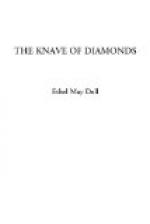Anne gave him some tea, and he set it on the hearthrug between his feet. The silence became lengthy. She was conscious of something in the atmosphere that made her vaguely uneasy. Was it a cat he resembled, crouching there in front of her? No, there was nothing domestic about him though she had a feeling that he could purr when he was pleased. Yes, there was undoubtedly something feline about him, a supple grace, a noiselessness, a guile, that made her aware of the necessity for caution in her dealings with him. This was a man of many subtleties—she knew it instinctively—a man of tigerish temperament, harmless as a kitten in sunshine, merciless as a fiend in storm. Yes, he was certainly like a tiger, forcible even in repose. She had never before encountered so dominant a personality. It affected her strangely, half-attracting, half-repelling, arousing in her a sense of antagonism that yet was not aversion.
“I wish you would say all that out loud,” said Nap. “You have such interesting thoughts, it is really selfish of you not to express them.”
“Surely not,” she said, “if you know what they are.”
He gave her an odd look as he lifted his tea-cup.
“The Queen’s jester is a privileged person,” he said. “When the door of her pleasaunce is closed to him he climbs up and looks over the wall.”
“Not always a discreet proceeding, I fear,” Anne remarked.
“Discretion, Lady Carfax, is but another term for decrepitude. I have detected no symptoms of the disease at present.” He drained his tea with an arrogant gesture and handed the cup for more. “Which is the exact reason why I have no intention of remaining on the top of the wall,” he said. “I will have a stronger dose this time, please.”
An unsteady hand began to fumble at the door, and Anne glanced up with a start. The blood rose to her face. “I think it is my husband,” she said, in a low voice.
Nap did not turn his head or answer. He sat motionless, still staring at her, till the door began to open. Then, with a sudden, lithe movement, he rose and kicked the hassock to one side.
A big man in riding-dress tramped heavily into the room, and stopped in the centre, peering before him under scowling brows. Not the kindest of critics could have called Sir Giles Carfax handsome, though every feature in his face was well formed. The blotchy complexion of the man and his eyes of glaring malice marred him all too completely. He looked about fifty, to judge by his iron-grey hair and moustache, but he might have been less. He had immensely powerful shoulders that stooped a little.
He continued to stand in the middle of the room and glare at the visitor till Anne quietly bridged the gulf.
“This is Mr. Nap Errol, Giles. Mr. Errol—my husband.”
She made the introduction without a tremor, but she kept her eyes downcast as if she did not wish to see them meet. Perhaps she divined that a gleam of supercilious humour flickered in Nap’s eyes as he made easy response.




